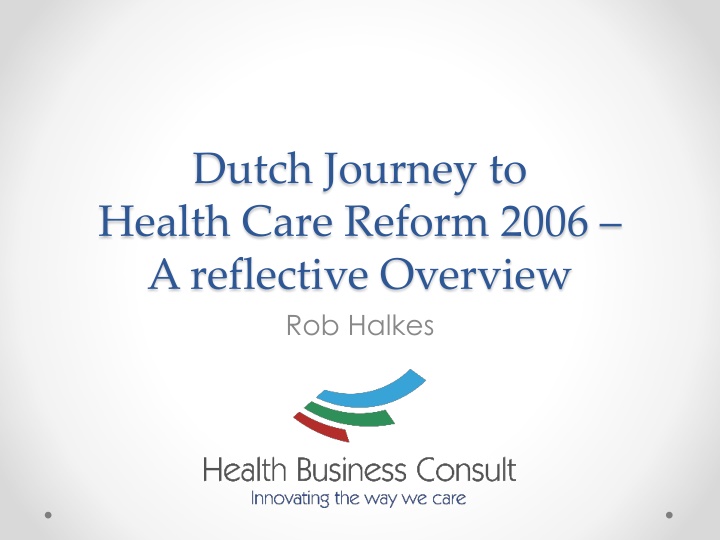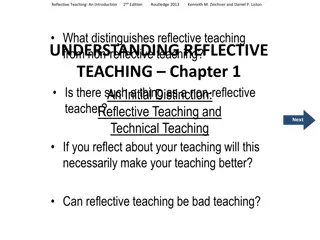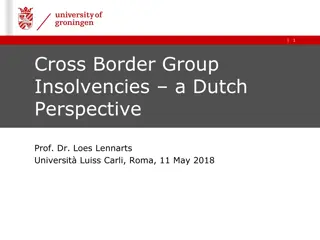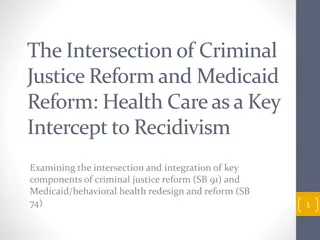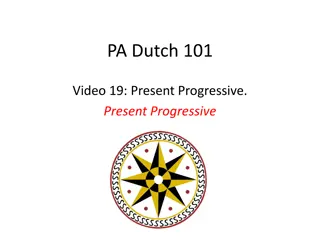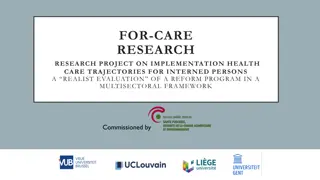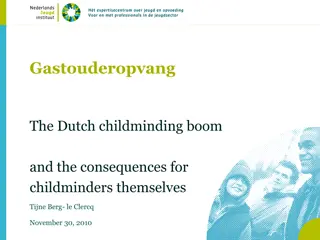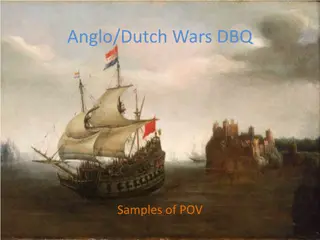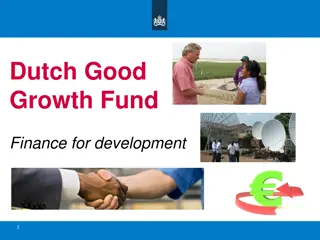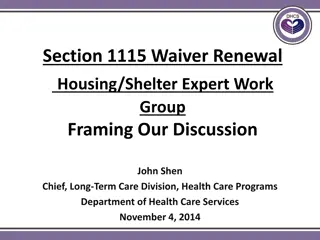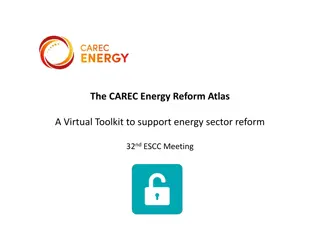Dutch Health Care Reform: A Reflective Overview of System Evolution
The Dutch health care system underwent significant reforms between 1980 and 2020, moving from cost containment to market liberalization, patient empowerment, and integration of care. The journey involved addressing rising costs, redesigning systems, market liberalization, and emphasizing chronic care, patient empowerment, and eHealth technologies.
Download Presentation

Please find below an Image/Link to download the presentation.
The content on the website is provided AS IS for your information and personal use only. It may not be sold, licensed, or shared on other websites without obtaining consent from the author.If you encounter any issues during the download, it is possible that the publisher has removed the file from their server.
You are allowed to download the files provided on this website for personal or commercial use, subject to the condition that they are used lawfully. All files are the property of their respective owners.
The content on the website is provided AS IS for your information and personal use only. It may not be sold, licensed, or shared on other websites without obtaining consent from the author.
E N D
Presentation Transcript
Dutch Journey to Health Care Reform 2006 A reflective Overview Rob Halkes
Reconstruction of Health Care Reform in the NL 1. 1980 2000 Cost Containment 2. 2000 2006 Awareness - System redesign? Towards market Liberalisation 3.2006 2010 Health Care as (regulated) Market 4. 2010 2020? Integrating Care Chronic Focus Redefining and Rationalisation Patient empowerment Ehealth
Overview HCD the system in general 1. Cost containment Costs of Care Rising what to do? Pricing Budgeting Supply (e.g. number of specialists)? 1. 1980 2000 Cost Containment 2. Price/budget ceilings don t work so what now System Redesign? Looking for structural solutions: Redesign Financial arrangements New HC structures Integrating Processes of Care - multidisciplinary collaboration Innovations? 2. 2000 2006 Awareness - System redesign? Towards market Liberalisation 3. Liberalisation as starting point (choice of system) HC Insurance companies as market directors New financial models: from budget per capita to performance based DRG - B-segment Negotiations Fees and salaries under pressure Strategic Focus at HC organisations (Hospitals Clinic) 3.2006 2010 Health Care as (regulated) Market 4. Building/ Programming for Care Differentiated attention: Chronic - integrated Primary care focus - Acute care to be rationalised Clinical focus super specialisation Disease management Ehealth Integrated pricing Restructuring Primary and Secondary care 4. 2010 2020? Integrating Care Chronic Focus Redefining and Rationalisation Patient empowerment Ehealth
The Dutch HC Journey characterised 1. Costs of Care Rising what to do? Trends leading to higher demands for care Parties and specifically payers, become aware of costs Budget control Pricing measures Electronic Prescription Systems(ErxS) substituting specialty drugs for generic 2. Price/budget ceilings don t work so what now Discussion of entrepreneurship in Care Insurance companies no more obliged to contract care. Budget negotiations Trans mural projects of collaboration (in outpatients) Rationalisation of Rx & Pharmaceutical care Local protocols GP Pharmacists (FTO) 3. Liberalisation HC insurers marketing: Consumer prefer low prices patient focused services Pharmacy preference pricing Cherie picking by initiators early adopters (ZBC specific clinics) Looking for transparent DRG system based on disease protocols Liberalisation of prices negotiations 4. Programming for Care Differentiated attention: Chronic integrated Primary care focus - Acute care to be rationalised Clinical focus super specialisation of professionals and centres Disease management Ehealth Integrated pricing Patient empowerment Technology Ehealth 1. 1980 2000 Cost Containment & Supply Control 2.2000 2006 Towards market Liberalisation Pharmaceutical Care GP&Ph 3.2006 2010 Health Care market - Insurers as market directors 4. 2010 2020? Integrating Care Chronic Focus Redefining and Rationalisation Patient empowerment Ehealth
Overview HCD the Pharma Journey 1. Costs of Care Rising what to do? 2. Pricing measures ERxS substituting Specialty drugs for generic 3. OPA (Omni Party Agreement self-regulation did not work) 4. Towards promotion control 5. Reference pricing (ERxS) max. prices - claw back because of margins 1. 1980 2000 Cost Containment & Supply Control 2. Price/budget ceilings don t work so what now Covenant: Price reduction generics 40% (2004, 2005) HCI: preference policy Omeprazol Rationalisation of Rx & Pharmaceutical care Local (FTO) protocols GP Pharmacy Account focus - Managers 3. Liberalisation Dutch Health Care Authority (NZA): market analysis towards long term policy of free pricing? Effects of price pressure - Standards of Care - price inclusion? Diminishing Access (to market, to Prescribers Contraction of care by Health (primary) Care Groups Chronic, integrated care focus 4. Programming for Care Disease management Differentiated attention: Chronic integrated Primary care focus - Acute care to be rationalised Clinical focus super specialisation Disease management Ehealth Integrated pricing Care coming Home 2.2000 2006 Towards market Liberalisation Pharmaceutical Care GP&Ph 3.2006 2010 Health Care market - Insurers as market directors 4. 2010 2020? Integrating Care Chronic Focus Redefining and Rationalisation Patient empowerment Ehealth
To some generalization? 1. 1980 2000 1. Awareness of costs and Cost Containment Cost Containment & Supply Control 2. Preparing for restructuring (partial) redesign 2.2000 2006 Towards market Liberalisation Pharmaceutical Care GP&Ph 3. Structural Redesign and Redefinition 3.2006 2010 Health Care market - Insurers as market directors 4. 2010 2020? Integrating Care Chronic Focus Redefining and Rationalisation Patient empowerment Ehealth 4. Building phase and work out?
What if you are amidst these developments and you do want to create a better market condition to health innovation, to your health business, to health care costs ?
Forecast of development is tricky Trends give direction but it is not sure what will dominate. Scenario studies give only a grand view of possible configurations of development. But, being within a journey, we only need to know in what direction the next step of development will move .. to have an informed choice for actively taking part in that development, to create a better market condition.
Systems forces that change Health Care Protocol development (evidence based medicine) Creation & Standardization of programs of care (integrated Care) Political reorganisation of Health Care System Cooperation between disciplines or parties involved Technology Financial aspects (budget cuts) Patient empowerment Reshaping our thinking..
To develop competitive advantages we need to think ahead of developments When You Don t Choose Your Market Strategy You can only be satisfied with the Left Overs of others
What are examples to enact new forces to change? Standardization: co creation of integrated care stakeholder involvement - expert committees - support to implementation support of experimenting for better care processes Protocol development: consensus meetings Cooperation between disciplines or between parties involved: local co-creative process development Technology, both in medical science and communication (internet, social media, mobile applications) Financial arrangements: exploring possibilities for contributions by parties with interest (e.g. employers, cooperation, collectives - stimulus programs from payers) Patient empowerment internet platforms and associations
References Apart from general knowledge and public sources (like the Dutch public periodicals: Financieel Dagblad, de Volkskrant etc.; and specific Dutch Heath Care journals: Zorgmagazine, Zorgvisie, ZNetwerk, Pharmaceutisch Weekblad, Medisch Contact, Zorgmarkt, etc.), we like to refer to the following sources par example: - Putters, K. Geboeid Ondernemen, een studie naar het management in de Nederlandse Ziekenhuiszorg.van Gorcum 2002. - Niet van later Zorg, Wie het weet mag het zeggen, Ministerie VWS, Den Haag 2007. - Diagnose 2025, Over de toekomst van de Nederlandse gezondheidszorg, Philip Idenburg, Michel van Schaik. Scriptum 2010. - Naslag #1, Historisch kader Geneesmiddelen standaard. Persoonlijk paper, KNMP. Den Haag augustus 2007. - See also Hans Maarse, Markthervorming in de zorg, Maastricht 2011
Drs. A.R.J. Halkes MHA rob.halkes@healthbusinessconsult.com P.O. Box 292 5050 AG Goirle The Netherlands M +31 6 31 66 2595 T http://www.twitter.com/rohal F http://www.facebook.com/rob.halkes L http://nl.linkedin.com/in/arjhalkes W www.healthbusinessconsult.com
